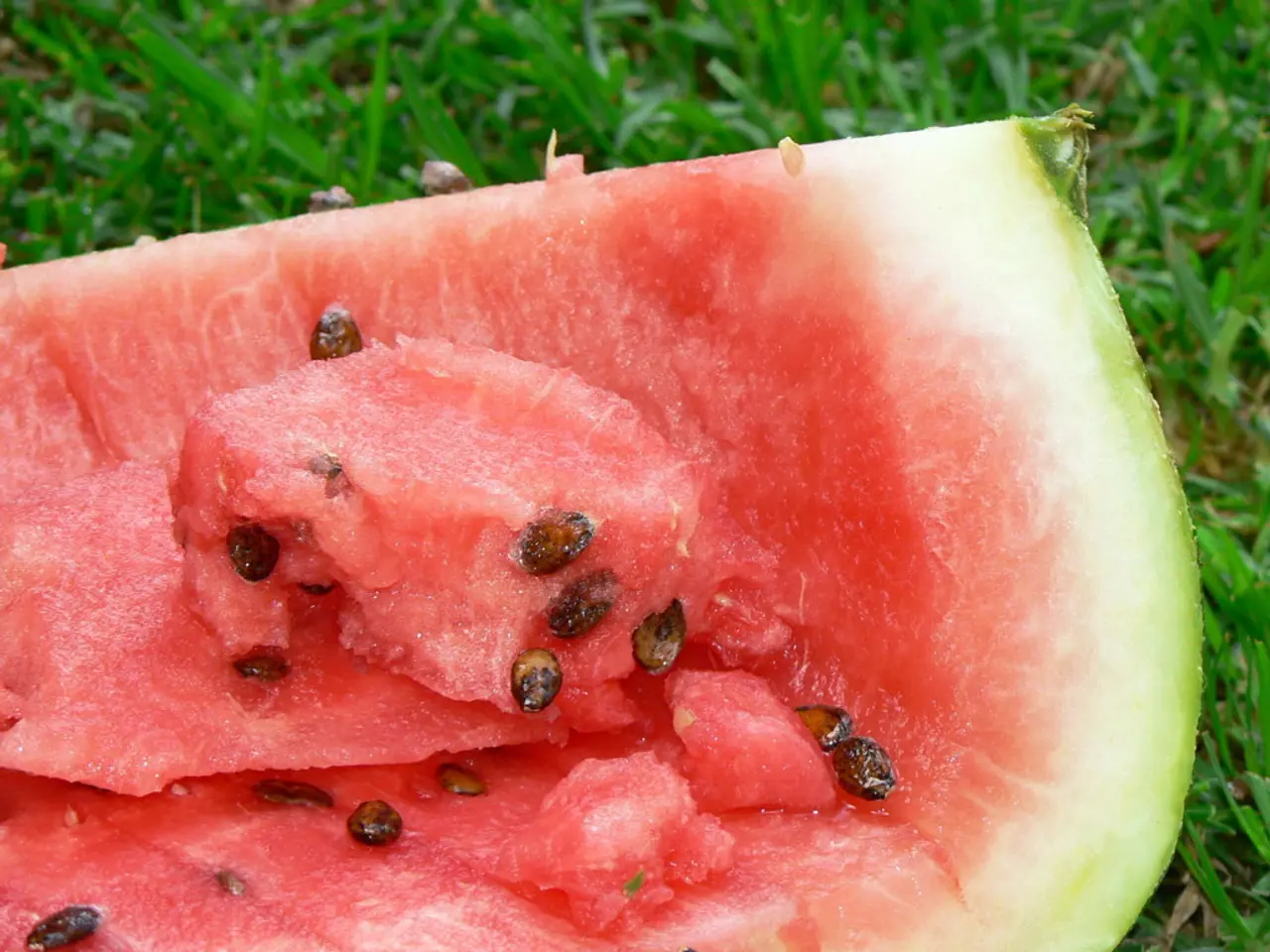Commemorating the Essential Impact of Summer's Beloved and Iconic Watermelon on August 3, 2025
Watermelon, a refreshing and juicy fruit beloved by many, has a rich history that traces back to the Kalahari Desert region of Africa thousands of years ago [1][5]. This sweet and refreshing fruit, scientifically known as Citrullus lanatus, was first domesticated in northeastern Africa, around Sudan and Egypt, by at least 2000–2340 BC.
From its African origins, watermelon spread across the globe. It was introduced to India in the 7th century, to China in the 13th century, to the Middle East and Mediterranean by the 10th century, and to Europe around the 17th century [2][4]. Today, watermelon is cultivated in over 100 countries, with China, Turkey, India, and the USA being top producers [6].
In India, watermelon farming supports thousands of small and marginal farmers. The country's warm climate makes it a favourable environment for this thirst-quenching fruit, which is grown both as a main crop and intercrop in river beds and sandy loams [7].
Watermelon is a nutritional powerhouse, despite being 92% water [8]. It contains essential nutrients such as vitamin C, vitamin A, some B vitamins, potassium, and antioxidants like lycopene. This antioxidant gives the red flesh its vibrant colour and is believed to offer heart health and anti-inflammatory benefits [1].
The celebration of National Watermelon Day, observed annually on August 3rd in the USA, isn't just about indulging in a watermelon. It's about celebrating health, farmers, food origins, and seasonal eating. It complements International Fruit Day, observed globally on July 1st, in reminding us of nature's generous offerings and the need to preserve agricultural diversity and sustainability [3].
The rind of watermelon is often overlooked but is 100% edible and is used in pickles or stir-fried in Asian cuisines [2]. In some cultures, watermelon seeds are roasted and eaten as snacks, packed with proteins and healthy fats [4]. Japan, for instance, grows square watermelons, which are cultivated in boxes to make them easy to stack and store [6].
The world of watermelon isn't limited to the red-fleshed variety we're most familiar with. There are over 1,200 varieties grown worldwide, ranging from red to yellow, orange, and even white-fleshed types [2]. Improved hybrid varieties like Sugar Baby, Arka Manik, NS 295, and seedless options have increased productivity and consumer appeal in India [7].
As we celebrate National Watermelon Day, let's take a moment to appreciate this juicy fruit's journey from its African roots to becoming a global favourite. Its refreshing taste, nutritional benefits, and cultural significance make it a summer staple worth cherishing.
References:
[1] Hodgson, D. W. (2011). The domestication of watermelon (Citrullus lanatus (Thunb.) Matsum. & Nakai). HortScience, 46(5), 947-950.
[2] Kader, A. A., & Al-Khayyal, M. A. (2000). Postharvest physiology of watermelon. Critical Reviews in Food Science and Nutrition, 40(5), 347-368.
[3] National Watermelon Promotion Board. (n.d.). National Watermelon Day. Retrieved from https://www.watermelon.org/national-watermelon-day/
[4] National Watermelon Promotion Board. (n.d.). Watermelon Facts. Retrieved from https://www.watermelon.org/watermelon-facts/
[5] Smith, D. G. (2005). The domestication of plants in the Old World tropics. Oxford University Press.
[6] Takeda, T., & Kobayashi, T. (2016). The history and cultivation of watermelon in Japan. Agriculture and Human Values, 33(6), 1165-1172.
[7] Verma, A. K., & Chauhan, R. (2015). Watermelon production and marketing in India. International Journal of Agricultural Research, 4(2), 156-161.
[8] Woolf, D. A., & Kensler, T. W. (2005). Watermelon: composition and nutritional benefits. Critical Reviews in Food Science and Nutrition, 45(7), 609-622.
- Embracing healthy cooking and a lifestyle that focuses on food-and-drink, one can explore various watermelon recipes using the nutrient-dense fruit, showcasing its place in health-and-wellness.
- The journey of watermelon from its African origins to the global markets is a fascinating story that demonstrates the influence of science in cultivating, distributing, and improving this popular food-and-drink item.
- Incorporating watermelon into daily diet can result in obtaining essential nutrients like vitamins, minerals, and antioxidants, contributing to a balanced and nutritious lifestyle, thereby ensuring proper health-and-wellness.




